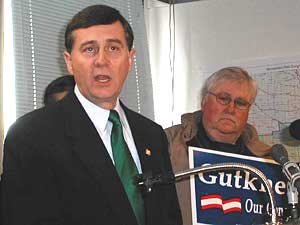 |
| Republican Congressman Gil Gutknecht says cuts in Medicaid will help reduce the federal deficit. (MPR file photo) |
St. Paul, Minn. — Medicaid, the nearly $300 billion a year program, is the country's largest medical entitlement for poor people. The federal and state governments each pay about half the cost. Projections show Medicaid's costs will more than double over the next decade.
U.S. Rep. Gil Gutknecht, a Republican who represents Minnesota's 1st District, says something must be done to slow the rate of increase. He supports a proposal to increase Medicaid drug co-payments by $1. Gutknecht says the drug co-pay increase will cause people on welfare to ask several questions about their prescription.
"'Is this (drug) really necessary?' Number 2, 'How much does this really cost?' And I might even add a third, 'Is there a generic available that could do just as good a job?'" Gutknecht says.
Provoking the questions, Gutknecht says, may slow the rate of increase in Medicaid's fast-rising prescription drug costs.
Critics say Congress isn't coming clean on the numbers. Nonpartisan groups looking at the House proposal find the copay costs would be much more than $1, some as high as $25.
Deborah Schlick, the director of St. Paul-based Affirmative Options Coalition, an advocacy group, says higher co-pays will cause some Medicaid recipients will skimp on or even go without medication.
"So what happens is people get significantly sicker, use more expensive medical care through the emergency room or intensive care," Schlick says.
The result, Schlick says, is taxpayers spend more, not less, on Medicaid.
She says the Senate version of the budget reconciliation bill is better. It would limit how much money drug companies and health plans can make from Medicaid program.
"So they (the Senate) come up with cuts that limit profits instead of inflict pain," Schlick says.
About 500,000 Minnesota residents are on Medicaid, at a cost of about $5 billion.
The welfare system, including Medicaid, can be a bureaucratic nightmare. People needing help can get lost. Minnesota Department of Human Services Medicaid director Christine Bronson says federal money has helped the state devise ways to lead people through the system and save money in the process. She worries proposed Medicaid cuts will undo the the case management that has helped connect people with services.
"That can certainly lead to potentially more expensive use of services, if they don't get to services soon enough and wind up in a crisis," Bronson says.
Another proposal in the House bill would cut funds for child support enforcement. Advocates say the cuts could cause families to fall into poverty, and push them onto the Medicaid rolls.
Ramsey County Board Chair Victoria Reinhardt, a Democrat, says counties use federal enforcement dollars to track down parents who owe child support. She says the cuts would mean less money for families that are supposed to receive the payments.
"In Minnesota, that estimate is $647 million less. So that's a real world example of how it's counterproductive, because those dollars pay for the staff that actually brings those funds in for the kids," Reinhardt says.
Rep. Gutknecht says he is sympathetic to people who may be affected by the proposed cuts. But, he adds, something has to be done to address the ballooning costs the Medicaid program is inflicting on taxpayers.
"We're reaching a point where we sort of have to bring the hammer down here in Washington to slow down the total spending we're doing -- not only on Medicaid, but on health care in general," Gutknecht says.
The House and Senate budget reconciliation bills would cut federal spending by between $35-$50 billion over the next five years.
However, the measures can't accurately be described as reducing the federal budget deficit -- part of their intended goal -- since they also propose permanent tax cuts totaling $100 billion for people who earn more than $500,000 a year.
A vote on the measures could come this week.





